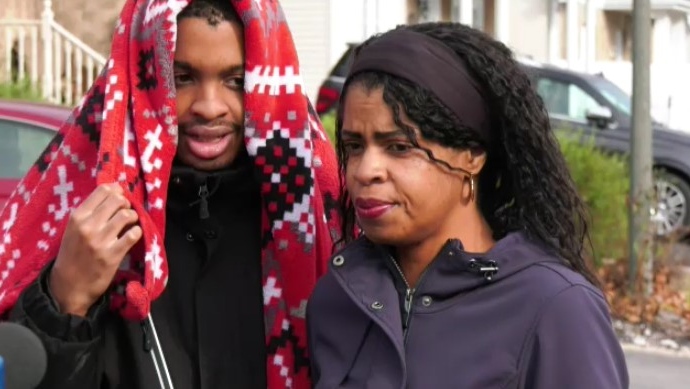Quebec mother upset after police Taser her non-verbal son who has autism
A Quebec mother is demanding to know why her non-verbal son who has autism was Tasered by police after running away from a local centre for people with special needs.
Marie Ismé said her 18-year-old son, Brandon, is not a threat and said his treatment by Mascouche police is the worst nightmare for someone with autism.
"They decided to Taser him, to shoot him with the Taser gun and [the police] said that was their best option because he was putting himself in danger," said Ismé told reporters Thursday near her home in Terrebonne, a suburb north of Montreal.
"I told them that, you know, Brandon, he's never been aggressive to you guys. He always cooperated with you guys."
Her son has been known to run away from the centre in the past, which Ismé has been complaining about for some time.
The centre's policy with her son when he tries to run away is not to stop him or go after him, but to immediately call police.
She said police were called to the centre twice on Wednesday, and on the second time, an officer decided to stop him using his Taser.
 Marie Isme, with her 18-year-old son, Brandon, speaks to reporters on Thursday, Nov. 10, 2022. (CTV News)
Marie Isme, with her 18-year-old son, Brandon, speaks to reporters on Thursday, Nov. 10, 2022. (CTV News)
The pins from the Taser device had to be surgically removed. On Thursday, his mother said he is more withdrawn and is sleeping more than usual, and since he can't communicate verbally, she worries she can't properly care for him.
She said since her son is not dangerous, she is wondering why officers considered the Taser as an appropriate response.
"They're afraid of my son. I think they're afraid of him. I just think that they're afraid because they always see that he's tall, but there are other tall kids there," Ismé said.
"He’s vulnerable, Brandon. He didn’t hurt anybody. There was no need for that. That’s extreme you know?"
TEEN ENTERED PEOPLE'S HOMES, POLICE SAY
Martin St-Pierre, who heads the professional standards section of the Mascouche police, said in a media briefing that it was too early to comment on the situation, which he said requires further investigation.
"It will have to be examined. I can't respond because it's too early. The case has to be analyzed," he said in a news scrum Thursday.
When asked if it's police policy to use a Taser on a person with autism, the chief said, "It depends on the intervention. Each intervention is really different."
 Martin St-Pierre is the head of the professional standards section of the Mascouche police service. (CTV News)
Martin St-Pierre is the head of the professional standards section of the Mascouche police service. (CTV News)
Both times the teen ran away from the resource centre, he allegedly entered into nearby homes, according to St-Pierre. It's not clear if the same officers were involved in each intervention on Wednesday. He said the police force is familiar with Brandon from previous calls.
"For several months, we've been in contact with the resource centre and in contact with the family as well to find some solutions in relation to the situation," the officer said.
Ismé said she's speaking out because she doesn't want the same thing to happen to another person with autism.
BETTER TRAINING?
The teen's mother said police officers don't know how to deal with people with special needs and need more training -- a sentiment echoed by civil rights activist Fo Niemi.
"There’s always a fear that an untrained police officer may not understand the behaviours of autistic children or people, and they may consider the conduct to be either dangerous or very threatening to oneself and to others," said Niemi, the executive director of the Montreal-based group Center for Research-Action on Race Relations.
What often plays a role in situations like Brandon's is the fact that the disorder is invisible, which requires special attention, according to Marla Cable, a resource and training centre coordinator at Giant Steps, who offers training to first responders.
"Part of the training we were doing, we were trying to encourage police officers to give space, to give time to use some sort of a visual or gestural cue if possible. But more often than not, giving space is really beneficial to a lot of autistic individuals," said Cable.
Giant Steps is a community organization that provides training and consultation services, and workshops to those who work with the autism community.
It developed a training program that guides first responders, teachers, and families with information and strategies on how to intervene with someone with autism in an emergency situation. Montreal police were one of the police services that received the training, which Cable said needs to be maintained on a regular basis.
"We are here. We are ready, willing, and able to go in and support any group that wants more training and support," she said.
CTV News has reached out to the centre that cares for Brandon for comment.
CTVNews.ca Top Stories

Prince William says wife Kate is 'doing well'
Prince William said on Friday his wife Kate was 'doing well' in a rare public comment about the Princess of Wales as she undergoes preventative chemotherapy for cancer.
BREAKING Canadian Blood Services apologizes to LGBTQ2S+ community for discriminatory blood donation policy
Canadian Blood Services issued an apology on Friday to the LGBTQ2S+ community for what it now admits was a harmful and discriminatory blood donation policy that prevented sexually active men who have sex with men and some trans people from donating blood and plasma.
BREAKING Toronto mayor hints that WNBA team is coming to the city, marking the first franchise in Canada
Toronto Mayor Olivia Chow says that she is hopeful an announcement could be made soon amid multiple reports that a WNBA team is coming to Toronto in 2026.
Magnitude 4.2 earthquake reported off Vancouver Island's west coast
A 4.2-magnitude earthquake was recorded west of Vancouver Island early Friday morning.
Ontario coroner to investigate death of man who suffered cardiac arrest while waiting in ER
A provincial coroner will be investigating the death of 68-year-old David Lippert, who suffered a cardiac arrest while waiting in a crowded emergency room in Kitchener, Ont.
'Irate male' assaulted Newfoundland officers with block of cheese, police say
Police in Newfoundland say patrol officers were assaulted Thursday by a "very irate male" wielding a block of cheese.
Average hourly wage in Canada now $34.95: StatCan
Average hourly wages among Canadian employees rose to $34.95 on a year-over-year basis in April, a 4.7 per cent increase, according to a Statistics Canada report released Friday morning.
This iconic Canadian song is turning 50
Andy Kim's 'Rock Me Gently' is marking a major milestone, as it celebrates its 50th anniversary.
From outer space? Sask. farmers baffled after discovering strange wreckage in field
A family of fifth generation farmers from Ituna, Sask. are trying to find answers after discovering several strange objects lying on their land.

































